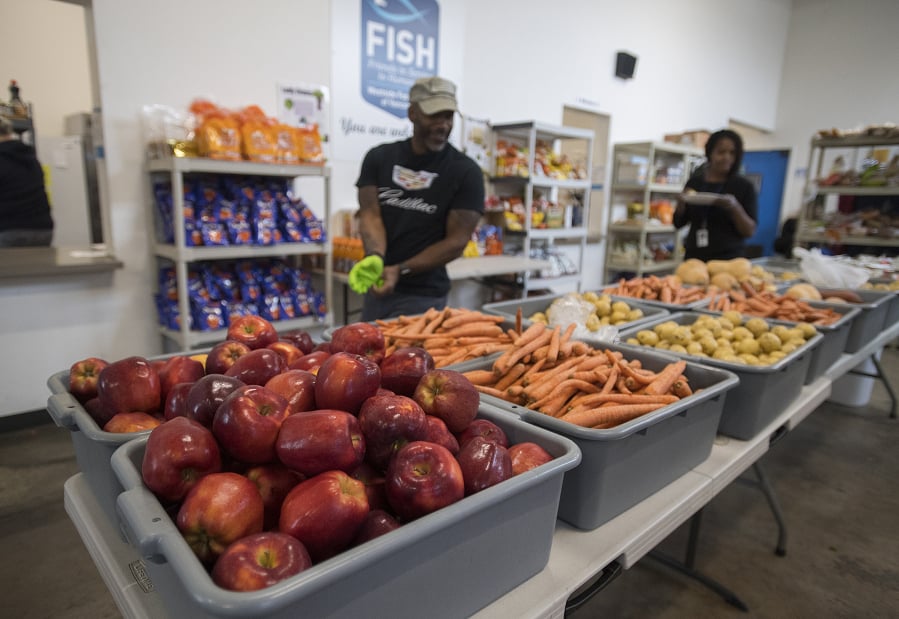As the partial government shutdown drags past its one-month anniversary, the closure’s impacts are spreading beyond furloughed and unpaid federal employees and hitting the general public.
In Clark County’s private sector and network of volunteers, the ongoing shutdown is starting to leave a mark.
Without institutional support from the U.S. Forest Service, restoration efforts in the Columbia Gorge have stalled. Without approval from the Alcohol and Tobacco Tax and Trade Bureau, local breweries can’t market new beer products across state lines. With food stamp programs facing limbo in March, the region’s food banks are wondering how their resources might handle some strain.
And with federal employees facing their second consecutive missed paycheck on Friday — the first time that’s happened in the country’s 38-year history of budget-related shutdowns — the private sector might take a hit in the form of money not spent. When people aren’t sure when their next paycheck will arrive, they’re not taking their families out to dinner.
“People are feeling pain, and some businesses are going to lose some revenue that they’re probably never going to get back,” said regional economist Scott Bailey.
The ripple effect
Long-term projects of “nonessential” federal employees are starting to suffer.
The Pacific Crest Trail Association, which organizes volunteer restoration efforts of public lands, had to cancel its scheduled excursion into the Columbia Gorge to help repair the devastation from 2017’s Eagle Creek Fire.
PCTA crews work with the U.S. Forest Service to ensure the volunteers’ safety, communicating via radio with rangers to assess risk, said Mark Larabee, the association’s associate director of communications and marketing. But those rangers haven’t been to work for the past month.
“Without that safety net, we’re unable to send our crews out, so we’ve had a couple of projects canceled already — one in Oregon and one in Southern California,” Larabee said.
It’s frustrating, he added, because the volunteers want to get back to work, and because the employees who take care of public land deserve to be treated fairly.
“The volunteers give their time and effort for free, and they do this because they love the trail,” Larabee added. “Having the government shut down kind of dismisses that effort.”
Brewers stymied
At Trap Door Brewing, a craft beer brewery in Vancouver’s Uptown neighborhood, co-founder Bryan Shull is facing a fast-approaching deadline: an appointment with a traveling cannery, to package a new beer with an uncertain future.
Beer made and sold exclusively within state boundaries needs its label approved only by the Washington State Liquor and Cannabis Board. But for beer to cross state lines — and in a border community like Vancouver, that’s pretty much all the beer — the label also needs approval from the Alcohol and Tobacco Tax and Trade Bureau, a federal agency.
“There’s guidelines for what you can put on a can; you can’t use profanity or market to children or anything like that,” Shull explained.
Usually, the rubber-stamping process is quick and simple, and brewers could count on receiving federal approval within seven to 10 days. But with nonessential functions of the bureau shuttered, brewers waiting for the green light to sell their product have been left in the cold.
Shull said he’d planned to sell around half of the new cans across state lines in Portland.
“Being this close to the Columbia River and the Portland market, that’s our primary marketplace,” Shull said.
He’s set to can his beer in the new packaging in two weeks, an appointment Trap Door made around six months ago. He still doesn’t have the federal go-ahead, and is trying to plan his next move.
“You have to figure out, what are you going to do with that beer? Do you cancel your canning appointment? What do you do?” Shull said.
Clark County is home to 22 microbreweries. Many are making the transition to cans, with trendy artwork and creative labels driving the customer demand, Shull said.
“Most of us are chasing this fantastic marketplace with this really artistic can art, and the beer that goes into that is red hot at this time,” Shull said. “And now, we’re hamstrung.”
Food bank worries
At FISH Westside Food Pantry of Vancouver, staff and volunteers are eyeing the coming month with some trepidation.
The food bank didn’t see a significant change in the number of households served between December 2017 and December 2018, and it’s too soon to tally the January comparison, said Operations Manager Wendy Bukoski. But misinformation surrounding a change to the Supplemental Nutrition Assistance Program schedule could cause some upheaval next month.
Due to the shutdown, EBT card holders received their February benefits early. Those benefits should last through February.
If the shutdown lasts into March, it could be two months before card holders receive additional funds.
But there’s some false rumors flying around that the changed benefit schedule comes with a “use it or lose it” stipulation, Bukoski said. Some EBT card holders wrongly believe that the early benefits need to be used by the end of January. Though she’s trying to quash the misinformation, Bukoski said the bank could be facing a month serving both furloughed workers and people who have run out of SNAP benefits.
“I’m kind of concerned about what February is going to look like, because people have been issued their SNAP benefits on the 20th of this month. There was some type of rumor going around that they had to use them before February — I don’t know why that would make sense to anyone,” she said.
“We’re just kind of wondering if our February is going to look extra busy.”
Avoiding the worst
Clark County hasn’t been hit as hard as some other regions of the country. The county is home to around 3,400 federal government jobs, Bailey said, but the majority of those are still making payroll.
Approximately 1,300 employees work at Bonneville Power Administration, 950 employees at the Vancouver Division of Veterans Affairs Portland Health Care System, 300 with the U.S. Postal Service and 240 at the Western Federal Lands Highway Division, Bailey said.
All of those federal offices remained open and operational through the partial shutdown.
Most of the lost jobs in Clark County came from shuttered parks and research facilities. The Fort Vancouver National Historic Site, the Cascades Volcano Observatory in Vancouver and the Ridgefield, Steigerwald Lake and Pierce national wildlife refuges employ a few dozen furloughed employees.
But that 3,400 figure doesn’t account for Clark County residents who travel across the Columbia River to federal jobs. The U.S. Coast Guard in Portland, where members are working without pay, employs Southwest Washington residents.
Others commute to Portland International Airport, where around 400 TSA agents and 60 air traffic controllers continue to work for free despite some telling lawmakers earlier this month that they’re selling plasma to make ends meet.
The official tally of local federal jobs also doesn’t account for government contractors, who won’t receive back pay for any work lost since Dec. 21.
Still, Bailey cautioned against using sweeping statements when describing the effects of the shutdown. Frankly, he said, we’re not sure how the consequences might play out in the long run.
“Who predicted it would last this long to begin with?” Bailey asked. “We’re in uncharted territory.”




